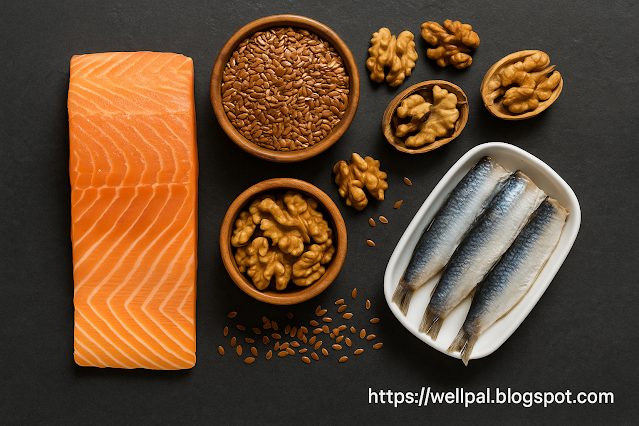- Get link
- X
- Other Apps
Omega-3 — Calm Inflammation, Lift Clarity
Omega-3s (EPA/DHA) help modulate inflammation and support brain/mood. Below: self-check, story, expert view, science, poll, imbalance tips, FAQs.
✅ 3-Line Summary (TL;DR)
- Omega-3s reduce inflammation and support brain clarity & mood.
- Modern diets are heavy in omega-6 → hidden inflammation risk.
- Rebalance your omega ratio to regain energy, focus, and calm. 💡🧠
🧪 Self-Check: Are You Low on Omega-3?
Tick all that apply. Educational only—not medical advice.
⏳ Analyzing your responses…
🌊 A Relatable Story — The Fog Behind the Fatigue
Derek, 45, had brain fog, joint aches, and snappy mood. Tests were “fine” — until an omega-6:omega-3 ratio came back 28:1 (often ideal ~2:1–4:1).
Switching to olive/avocado oil, fatty fish 2×/week, and an omega-3 supplement lifted energy and clarity quickly.
“I didn’t need medication. I needed balance.”
👩⚕️ Expert Dialogue: Why Omega-3s Matter
Dr. Asha Malik, Integrative Cardiologist
“EPA/DHA do more than heart health — they modulate inflammation, protect neurons, and steady emotions.”
“Many people run a high omega-6:omega-3 ratio, which can tilt toward chronic inflammation and symptoms like joint pain, eczema, brain fog, and fatigue.”
“Rebalancing often lifts symptoms: clearer thinking, smoother skin, calmer joints.”
“Nutrition isn’t an add-on. It’s foundational biochemistry.”
🔬 Science Snapshot — What Omega-3s Actually Do
- EPA: helps lower inflammatory cytokines; supports heart/immune health.
- DHA: structural for brain; supports memory and calmness.
- Low intake is associated in research with depression, ADHD, cognitive decline, and some autoimmune patterns.
- Typical intakes are often <200 mg/day — below many expert targets.
📚 Sources
📊 Quick Poll
What benefit would you love most from better omega-3 levels?
⚠️ The Omega Imbalance: Why It Matters
- Excess omega-6 from some seed/processed oils can skew toward pro-inflammatory signaling.
- Omega-3s tend to be anti-inflammatory/resolving.
- Balance is key → tipping the scale affects healing vs. inflammation.
- Brain, heart, skin, gut, and joints all feel the difference.
Avoid or limit: corn/soybean/sunflower oils; ultra-processed snacks, margarine, dressings.
Swap in: extra-virgin olive oil, avocado oil, grass-fed butter/ghee.
🤔 FAQ — Omega-3 Essentials
1) What’s better—fish oil or flaxseed oil?
A: Fish oil provides EPA/DHA directly. Flax (ALA) must convert with low efficiency (~5%).
2) Can I get too much omega-3?
A: Up to ~3 g/day EPA+DHA is generally considered safe for most adults; >5 g may affect clotting. Follow clinician guidance.
3) Vegan-friendly options?
A: Algae-based EPA/DHA oils; plus ALA sources like flax, chia, walnuts.
4) When will I notice a difference?
A: Mind/mood: ~2–4 weeks; skin/joints: ~6–8 weeks with steady intake.
5) Should I test my omega levels?
A: Ask for an Omega-3 Index blood test; many aim for 8% or higher.
🌟 CTA — Reclaim Calm, Clarity, and Control
You don’t need another trend—you need your biology rebalanced.
- 🧘♀️ Add fatty fish, swap oils, track your progress.
- 🌿 Consider quality fish oil or algae-based EPA/DHA.
- 🧠 Your mind, mood, and body will thank you.
The solution isn’t extreme—it’s essential. Start your omega-3 reset today. ✨
Educational content only; not medical advice.



Comments
Post a Comment